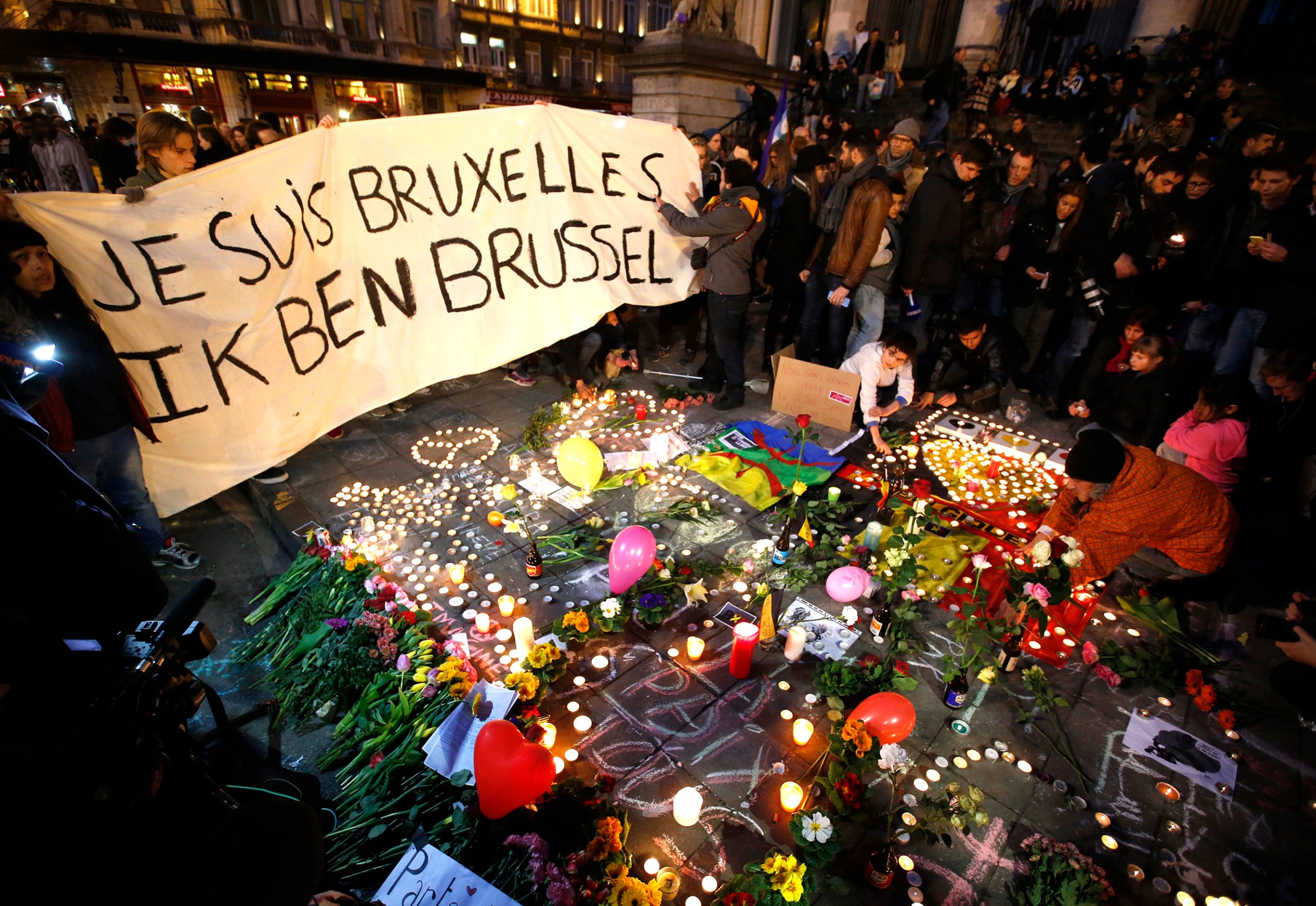
On September 11, 2001, after watching the smoke balloons spiral out of the Pentagon, I waited for five frozen hours to hear from my then-boyfriend. I waited with my coworkers as we sipped warm chardonnay and watched CNN at Rhodeside Grill in Arlington, Virginia. I waited in a beige bathroom stall, wondering if linoleum protected against bombs. I waited in front of my computer, numbly refreshing whatever news site still seemed to be working
He finally called from a payphone. (Remember payphones?) My now-husband was walking home along I-395 beside hordes of other bewildered commuters, having arrived at the Pentagon Metro station stop seconds after the building was hit.
Since then, there have been more random acts of terror. Boston. Paris. San Bernardino. And yesterday, Brussels.
Those of us who’ve witnessed terrorism firsthand sometimes relive it, especially whenever it happens again. But I’m not just someone who scrambled to locate a loved one on September 11. I’m someone who also happens to have panic disorder. (The attack in 2001 didn’t cause my panic disorder, but it certainly didn’t help.)
When you have an anxiety disorder, every day is filled with a million ordinary terrors. Before I underwent treatment, I would constantly scan for threats. That weird bump on my neck? Could be a tumor. Boss seem annoyed? I was clearly about to get fired, so I’d flash-forward to a retirement spent nibbling Fancy Feast. The plane I was about to board? Try to enjoy your tomato juice and trashy paperback while you’re terrified of crashing.
According to the Anxiety and Depression Association of America and the National Institute of Mental Health, about 18% of U.S. adults have an anxiety disorder—and women are 60% more likely to experience one than men are. Our consciousness is a funhouse mirror, and the real enemy is our mind. Subway cars, shopping malls, grocery stores: You never know when your throat might tighten, your heart might race and you’ll want to jump out of your skin and bury yourself in bed. Everyday fears are constantly blown out of proportion.
And so you prepare. You make your world safe, and you make your world small. You think you can outwit fate by getting there first. When my panic disorder was at its peak, I couldn’t go to work, drive a car or leave my house.
I don’t live that way anymore because it’s exhausting to babysit imaginary fears. In treatment, you learn to sit with the panic, to let the feelings of terror wash through you until they pass. After September 11, I made myself sit on subway cars until my heart stopped racing. I forced myself onto planes until I landed safely enough times that it seemed like the norm instead of good luck. That’s the physical retraining.
Intellectually, you’re forced to confront the futility of worry. In today’s world, against a backdrop of real terror, this is far more complex. It’s tempting to try to say, “Of course something like this will never happen to me. Why be afraid?” But as we were reminded yesterday, anything can happen to anyone, whether we panic about it in advance or not, no matter how many hours of therapy we’ve had.
To some degree, in an age of terror, all of us are living in this state of constant vulnerability. Terrorism—its randomness, its acuteness—might be anxiety’s worst premonitions come to fruition. Subways? Grocery stores? Malls? They’re usually safe, but not always. We’re all at the mercy of chance.
So in a way, dealing with a million imagined terrors for years has made me more prepared for this new world. We have no control. Knowing this is unsettling but freeing. Some of us will be blindsided by cancer. Some of us might be blindsided by terror. The universe is random and often cruel. This is bleak but liberating at the same time.
Because when you come out the other side of anxiety treatment, you learn that your mind can be a safe place. You learn to live second by second, breathing in, breathing out, each moment of peace building on itself until you construct a new sense of calm, one that will hopefully hold in the face of fear.
Of course, I’m not totally Zen. Do I wonder if this is the time my luck will run out when I board planes? Definitely. Do I sometimes stand in large crowds and imagine bombs going off? All the time. Have I pictured gunmen bursting into my son’s school? Absolutely. These days, I imagine most people contemplate these things, whether they have an anxiety disorder or not. Some of us have actually experienced them firsthand, and I don’t for a second take for granted that I’ve never experienced true loss or true hurt. I’ve imagined it, but I haven’t lived it.
But I do have the perspective that comes with enduring a thousand fake fire drills. Living in constant fear isn’t living at all. I came to learn this against the backdrop of relative safety, but it applies in times of fear, too. The only way to honor the lives we have now is to enjoy them while we can. Bad things can happen, but fighting imagined battles deprives us of life’s goodness. When we let our fears take control, we lose right away.
Kara Baskin is a journalist in Boston and a regular contributor to The Boston Globe and Boston Magazine; she used to work for New York Magazine and the New Republic.
More Must-Reads From TIME
- The 100 Most Influential People of 2024
- The Revolution of Yulia Navalnaya
- 6 Compliments That Land Every Time
- Stop Looking for Your Forever Home
- If You're Dating Right Now , You're Brave: Column
- The AI That Could Heal a Divided Internet
- Fallout Is a Brilliant Model for the Future of Video Game Adaptations
- Want Weekly Recs on What to Watch, Read, and More? Sign Up for Worth Your Time
Contact us at letters@time.com